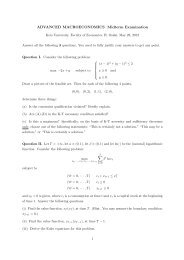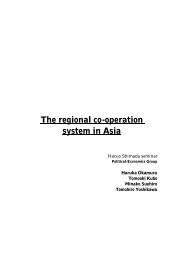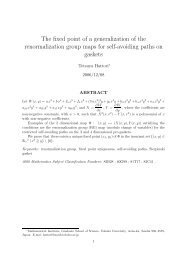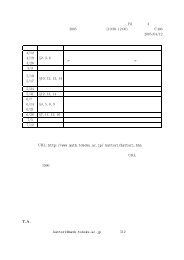Professional Career Programme (PCP) Syllabus for ... - Keio University
Professional Career Programme (PCP) Syllabus for ... - Keio University
Professional Career Programme (PCP) Syllabus for ... - Keio University
Create successful ePaper yourself
Turn your PDF publications into a flip-book with our unique Google optimized e-Paper software.
Faculty of Economics, <strong>Keio</strong> <strong>University</strong>Week10: Law and innovationWeek11: Law and globalizationWeek12: A Law and economic growthWeek13: Judicial re<strong>for</strong>mEvaluation:Presentation, writing assignment, attendance & class participationENVIRONMENTAL LAW AND ECONOMY (<strong>PCP</strong>) (Intensive Course)Instructor: Yukari Takamura, Part-time LecturerCourse Description:Law is essential <strong>for</strong> preventing environmental damage as well as <strong>for</strong> improvingenvironmental quality. However, the law disregarding economic principles couldmake our economy disordered and could make it even impossible to achieve our goal<strong>for</strong> protecting the environment. On the other hand, any economic activity cannotignore legal rules related to the activity. This course aims at studying environmentallaw including international environmental law, especially focusing on interrelationshipbetween environmental law and economy. The main topics of the course are asfollows:Course Plan:1. Environmental Law: Its Origin and DevelopmentsEnvironmental law is a body of public regulations intended <strong>for</strong> combating againstenvironmental pollution and adverse impacts on the environment due to expansionand developments of economic activities. The course deals with the history ofenvironmental law, considering historic developments of economic activities.2. Fundamental Principles of Environmental LawEnvironmental law in each country has been evolving, influenced by policycoordination and environmental regulation at international level, and it hasdeveloped common fundamental principles, which constitute pillars of its legalsystem. The lecture deals with some of such principles, including polluter-paysprinciple (PPP) and precautionary principle.3. Instruments Aiming at Environmental ProtectionEnvironmental law makes use of various instruments in order to achieve its goal <strong>for</strong>environmental protection. In addition to traditional "command and control", weexamine economic instruments, such as emissions trading, environmental tax andsubsidies, which have received more and more attention recently.4. Climate Change as Case Study<strong>PCP</strong> <strong>Syllabus</strong> 5






